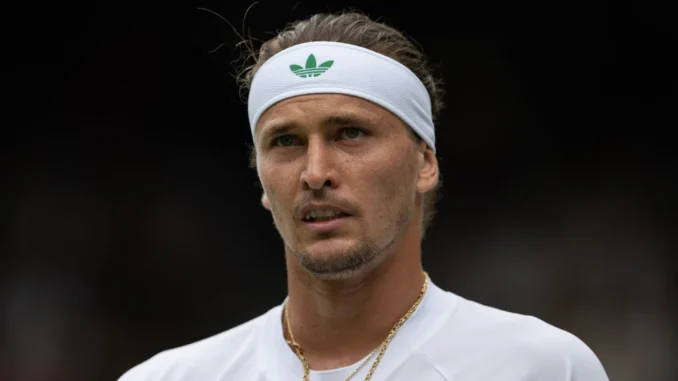
The tennis world is abuzz with discussions of reform following a series of pointed comments from world number three Alexander Zverev, whose frustrations with the sport’s grueling schedule have reignited debates about player welfare and the sustainability of the professional tour. As the 2025 Wimbledon Championships unfold, Zverev’s remarks, made in the wake of his shocking first-round exit to Arthur Rinderknech, have cast a spotlight on the physical and mental toll of tennis’s relentless calendar, prompting calls for significant changes to protect players and preserve the sport’s future.
Zverev, a 28-year-old German with 24 ATP titles and three Grand Slam final appearances, has been a vocal critic of the ATP Tour’s demanding schedule. “There is no other sport where there is so much play, this cannot continue,” he declared last year, highlighting the health risks posed by a season that stretches from late December to mid-November. His concerns resurfaced after his 7-6(3), 6-7(8), 6-3, 6-7(5), 6-4 loss to Rinderknech at Wimbledon, a match that spanned two days and over four hours. The defeat, his earliest at a major since 2019, left Zverev visibly drained, both physically and emotionally. “I feel, generally speaking, quite alone in life at the moment, which is not very nice,” he admitted in a post-match press conference, revealing a deeper personal struggle. “It’s not a feeling on a tennis court, it’s just a life feeling in general. I’ve never felt this empty before.”
Zverev’s candid admission of feeling “lacking joy in everything that I do” has sparked a broader conversation about the mental health challenges players face under the current system. The 2025 season has been particularly taxing, with Zverev competing in 49 matches by early July, including a run to the Australian Open final and a Munich ATP 500 title. His decision to take a four-week break until the Toronto Masters reflects a desperate need for respite. “I have to solve myself first. I have to solve my issues,” he said, emphasizing that his struggles extend beyond the court. Zverev’s openness about considering therapy—“For the first time in my life, I’ll probably need it”—has resonated with peers like Aryna Sabalenka, who urged him to address his mental health before it “destroys” him, drawing from her own experience with therapy.
The call for reform is not new, but Zverev’s stature as a top player amplifies its urgency. The ATP and WTA Tours have faced criticism for their packed schedules, with players often competing in back-to-back tournaments across different surfaces and time zones. The 2025 calendar, which began with events on December 29, 2024, and includes mandatory Masters 1000 events, leaves little room for recovery. Zverev’s comments echo those of other players, including Carlos Alcaraz, who criticized the inconsistent tennis balls used across tournaments, and Iga Swiatek, who has advocated for fewer mandatory events to reduce burnout. The physical toll is evident in injuries like Novak Djokovic’s groin issue at the Australian Open and Zverev’s own mid-match illness at the Halle Open, where he battled through nausea to reach the semi-finals.
Zverev’s Wimbledon loss, marked by his inability to convert any of nine break points against Rinderknech’s booming serve, underscored the mental and physical fatigue that can derail even the best players. “I think generally [Arthur] played a fantastic match,” Zverev acknowledged, giving credit to his opponent while hinting at deeper issues. “Something within me has to change, which is not necessarily on the tennis court.” His struggles are compounded by off-court challenges, including media scrutiny and personal difficulties, which he says have left him feeling isolated. His daughter, Mayla, remains his brightest source of joy, but at four years old, she cannot bear the burden of his emotional well-being. “I must make her happy, not the other way around,” he reflected.
The tennis community is now grappling with how to address these concerns. Proposals include shortening the season, reducing mandatory tournaments, or introducing longer off-season breaks to allow players to recover. The introduction of coaching pods at the Australian Open, which Zverev called an “innovation” he was skeptical of, reflects the sport’s attempt to evolve, but such changes often spark debate. “Tennis is getting innovation as well,” Zverev noted, though he questioned the value of such measures compared to addressing scheduling issues. The ATP’s adoption of electronic line-calling systems, which Zverev criticized after a controversial call at the Madrid Open, further highlights the sport’s growing pains as it balances tradition with modernization.
As Wimbledon 2025 progresses, with top seeds like Jannik Sinner and Carlos Alcaraz advancing, Zverev’s absence from the later rounds serves as a stark reminder of the sport’s demands. His call for change, backed by a 35-14 season record and a third-place standing in the ATP Live Race to Turin, carries weight. The tennis world must now decide whether to heed his warning and prioritize player health, or risk losing more stars to burnout. For Zverev, the path forward involves finding joy again—both in tennis and in life—while the sport he loves faces a critical moment of reckoning.
Leave a Reply